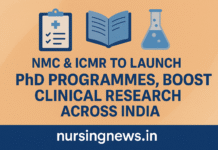In the ever-evolving field of nursing, specialized knowledge and skills are vital for providing high-quality patient care. India offers a range of Post Basic Diploma programs in nursing, each focusing on a specific area of expertise. These programs, lasting one year, are recognized and regulated by the State Nursing Councils or Universities. Let’s delve into some of these specialized diplomas and explore how they empower nurses to excel in their respective fields.
- Post Basic Diploma in Operation Room Nursing:
The Post Basic Diploma in Operation Room Nursing equips nurses with the necessary skills to excel in operating room environments. This program covers topics such as aseptic techniques, surgical instrumentation, anesthesia administration, and patient monitoring during surgeries. Nurses specializing in Operation Room Nursing play a crucial role in ensuring the safety and efficiency of surgical procedures. - Post Basic Diploma in Cardio Thoracic Nursing:
Cardio Thoracic Nursing focuses on the care and management of patients with cardiac and thoracic disorders. Nurses undertaking this diploma gain in-depth knowledge of cardiovascular anatomy, common cardiac procedures, post-operative care, and interventions for cardiac emergencies. These specialized nurses provide compassionate care to patients with heart and thoracic conditions, both in hospital settings and during rehabilitation. - Post Basic Diploma in Neurology Nursing:
Neurology Nursing focuses on caring for patients with neurological disorders, such as stroke, epilepsy, multiple sclerosis, and traumatic brain injuries. This diploma program equips nurses with specialized knowledge in neuroanatomy, neurological assessment, medication management, and rehabilitation techniques. Neurology nurses play a pivotal role in helping patients regain optimal function and improve their quality of life. - Post Basic Diploma in Midwifery Nursing:
Midwifery Nursing focuses on providing comprehensive care to women during pregnancy, childbirth, and the postpartum period. This program emphasizes prenatal care, labor management, newborn care, breastfeeding support, and postpartum counseling. Midwifery nurses work closely with expectant mothers, ensuring a safe and positive birthing experience while promoting maternal and infant health. - Post Basic Diploma in Psychiatric Nursing:
Psychiatric Nursing specializes in the care and support of individuals with mental health disorders. Nurses undertaking this diploma gain knowledge in mental health assessment, therapeutic communication, psychopharmacology, and crisis intervention. Psychiatric nurses play a crucial role in providing compassionate care, counseling, and medication management to individuals of all ages who are experiencing mental health challenges. - Post Basic Diploma in Ayurveda Nursing: Ayurveda Nursing is an emerging field that aims to train specialized nurses capable of providing competent care to patients seeking Ayurvedic treatment for various health conditions. According to Ayurveda, the role of a Paricharika (Nurse) is considered a vital component (Chikitsa Chatushpada) of the healthcare system. The comprehensive guidelines for Ayurveda Nursing are outlined in classical texts.
- Post Basic Diploma in Paediatric Nursing: Infants, children, and adolescents up to the age of 18 are the primary beneficiaries of the specialised care and support provided by paediatric nurses. This diploma programme gives nurses the fundamental abilities and information required to treat young patients in an age-appropriate manner. Child development, paediatric pharmacology, dietary recommendations, and treating common paediatric ailments are among the topics covered in the programme. In a variety of healthcare settings, paediatric nurses are crucial in promoting children’s health, avoiding illnesses, and ensuring that young patients are treated in a soothing and kid-friendly environment. Their commitment and compassion greatly enhance the general wellbeing of kids and their families.
These are just a few examples of the diverse range of Post Basic Diploma specializations available in nursing. Other specializations include Critical Care Nursing, Emergency & Disaster Nursing, Oncology Nursing, Ortho and Rehabilitation Nursing, Geriatric Nursing, Neonatal Nursing, Forensic Nursing, Haematology Nursing, and Burn & Reconstructive Surgery Nursing.
Admission to these programs generally requires candidates to have completed their General Nursing & Midwifery (GNM) or Basic B.Sc Nursing, hold a valid nursing registration, and meet the eligibility criteria set by the State Nursing Council or University. Additionally, some institutions may conduct entrance exams or interviews as part of the selection process.
By pursuing these specialized diplomas, nurses enhance their clinical expertise, develop a deep understanding of specific medical conditions, and improve patient outcomes. These additional qualifications not only broaden career opportunities but also contribute to the overall advancement of the nursing profession in India.












